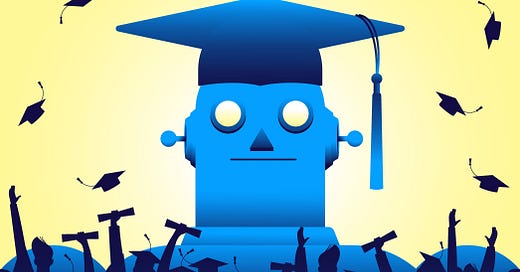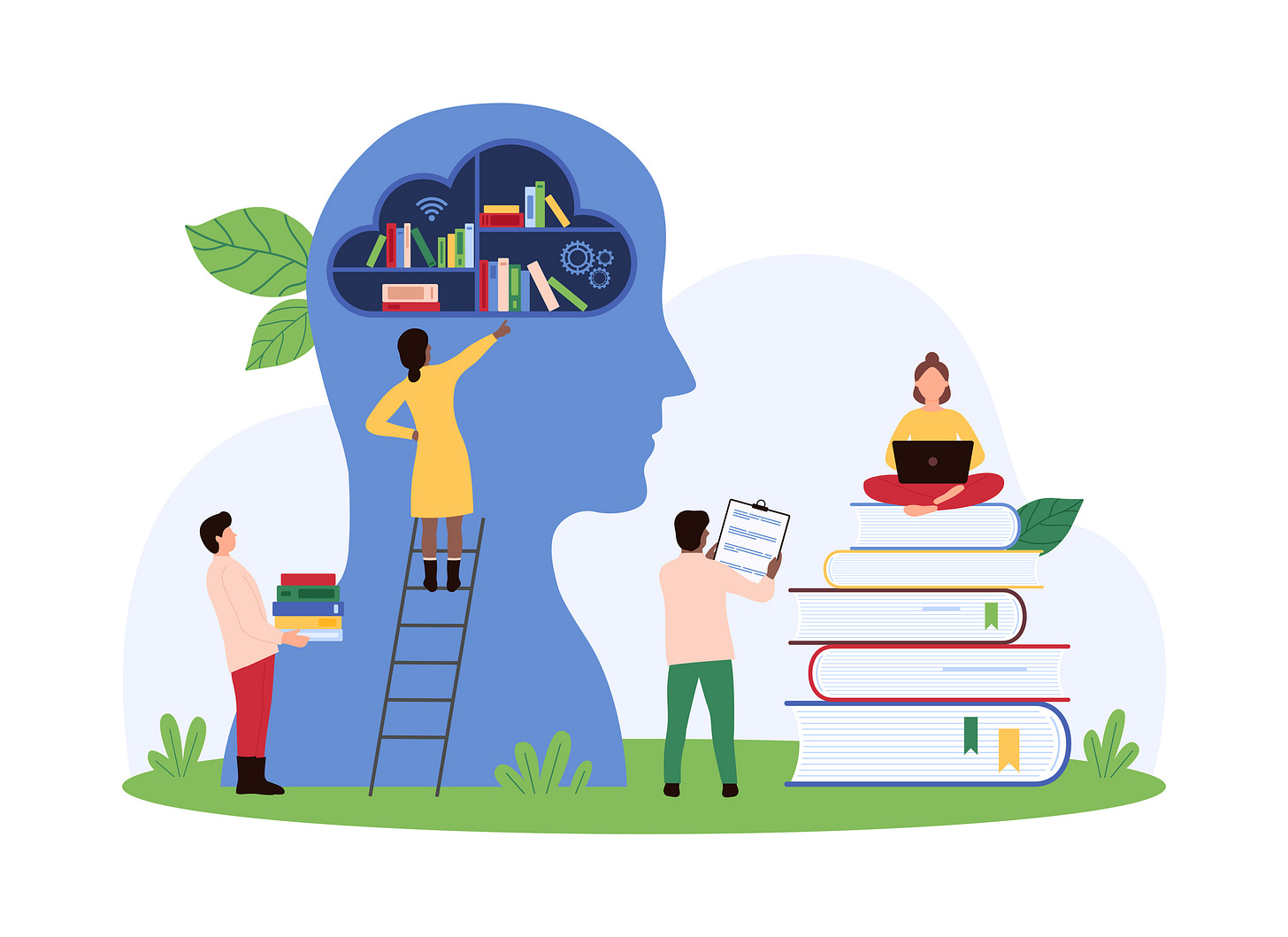Editorial By Dr. Gabriella Korosi
Schools and education have changed a lot since I was a child. The first time I learned about computers was in the last year of my high school and nursing school education in Hungary. I have never dreamed of working with a computer and now 30 years later computers are everywhere and a commonly used item. Many can not even imagine our lives without it. I used to type up my writings and poetry on a typewriter. I used notebooks instead of iPads to write on. Read books in an actual physical book, not on a Kindle or on the computer. we had a wired-in phone, not a phone one could carry. The list goes on. Now AI is in our lives. How will this change the knowledge and understanding of the future generation?
The Risks of Generative AI in Education
By Gabriela Trofin -Tatar
I have been noticing for a while online how the rapid integration of artificial intelligence (AI) into education has sparked discussions among parents, especially those involved in homeschooling and world-schooling, but not limited to them.
“AI has the potential to transform educational systems by improving their effectiveness and efficiency. AI-powered tools can automate administrative tasks like grading and data analysis, freeing up more time for educators to focus on instructional design, individualized support, and personalized feedback. This shift enables educators to adopt a facilitative role, guiding students along their learning paths and providing targeted interventions when necessary.” - Revolutionizing Education
While AI tools can potentially enhance learning experiences, they rather hinder the natural curiosity and developmental processes, especially in young children.
Complacency and dependency
Probably one of the most worrisome risks is that students are already becoming overly reliant on AI tools. This is already happening for continuous education enthusiasts, which is great. However, when it comes to educating children or young students, this becomes concerning.
Think how easily, with a few keyboard strokes, the student could get immediate answers to a difficult math problem or a complex analysis of a text. This leads to dependency and could limit critical thinking and creativity.
What happens is that students would miss valuable opportunities to develop their problem-solving skills.
AI-generated solutions are not necessarily the answer to a better education in schools. I welcome your opinions and experience on this topic.
Superficial learning
Generative AI can also encourage superficial learning. We all know that AI is quick to give quick facts or summaries. So students won’t need to read a whole 400-page book, for example. They might choose not to engage deeply with the material, as they get used to shortcuts.
What happens then? They won’t learn or slowly lose their ability to synthesize information, draw connections, and develop a complete understanding of various subjects.
Learning is a rich and complex process, based on repetition and curiosity. It is also about debating ideas, making mistakes, and learning from them. It is also about engaging in discussions with peers, working in teams on various projects, and presenting findings. All these experiences get diminished when students lean too heavily on technology.
Now what about the human agency in education?
When students choose AI increasingly for guidance on assignments or projects, they may lose confidence in their decision-making abilities. I am afraid this shift could lead to a generation that struggles to think independently and critically.
Here’s a question for you:
What remains to be studied if we rely on algorithms for our educational journeys?
Finding the balance and integrating AI thoughtfully
Generative AI has a lot of benefits though, so I am not saying it shouldn’t be used at all. Rather, to be used with a certain discernment, more in the case of older kids.
I think we need to find a balance between technology and traditional learning methods.
I thought a lot about and I would like to share some strategies for parents and educators:
Encourage Active Engagement
Promote activities that require active participation and exploration through hands-on experiments, discussions with peers, or just using real books in libraries. The key is to nurture curiosity in kids as much as possible.
Since September I started taking my kids to the library, even if we already have plenty of books at home. Now every time we pass by the library, they ask us to get in to explore, to touch, and to choose new books to borrow. I am a book lover myself, and my heart is melting when I see this behavior. These trips to the library have also made me pick up books again to read myself. Reading nurtures children’s and adults’ curiosity far more than AI tools could, that’s for sure.
Set Clear Boundaries for AI Use
My kids are too young to use AI, but I see that in school, already in 3rd grade, the teacher started introducing some apps on laptops. It’s some sort of learning vocabulary through play, for example. It is more fun and more comfortable to educate with screens than making time (somehow) for evaluating and teaching each kid. There are more than 20 kids in class, so that can be overwhelming. What happens when AI takes over teaching, slowly?
I think we need clear guidelines for when and how AI tools should be used in educational contexts. We need to make sure that traditional study methods remain integral to the learning process. It’s ok to benefit from technology, but without becoming overly dependent on it.
Foster Critical Thinking Skills
I would like ask, if you are a teacher or professor, would you offer exercises that challenge students to think critically about the information provided by AI? Students should learn to avoid simply accepting what an algorithm presents. Instead, they should research if the info in accurate and if the language is ok. Such analytical skills are essential for academic success and personal growth.
Emphasize Human Interaction
“There is the excitement that AI has the potential for personalized learning and to help students develop skills for this AI-driven society. But like many of you, I share the same concerns about the outlook of this, what we call the 'AI generation,’” she says. “There are so many questions, we don't have answers yet. When we talk about children's ability to actually find answers and learn on their own, and is using 'hey' to command or activate AI makes kids forget about politeness. And perhaps the most worrisome to a lot of people is whether children would become more attached to AI than to the people around them.”
— Jill Anderson in The Impact of AI on Children's Development
Keep as much face-to-face interaction with teachers and peers. With the age of online courses, this gets more difficult to achieve, unless by Zoom or Teams lives.
Human connections remain vital for developing social skills and emotional intelligence. All these qualities cannot be replicated by AI. Encourage group projects or discussions that allow students to share ideas and learn from one another.
Responsible Technology Use
This gets us back to the previous week’s discussion here. Parents and educators should model responsible use of technology.
To wrap this up
While generative AI can enhance educational experiences, it has its risks. Traditional learning methods should coexist with technological advancements so that we can help our children learn both digital literacy and critical thinking skills.
It’s not just about adapting education to the use of AI, but to make sure that our children thrive within it. We need to keep our kids/students curious, engaged both about human knowledge and AI.
It would be great to continue this conversation about finding the right balance in education.
Please share your own experiences of problem-solving without immediate recourse to technology.
What strategies have you found effective?
P.S.
If you have been looking for an inexpensive yet thoughtful gift for someone you share knowledge with, consider gifting a subscription to Dancing Elephants Press on Substack. This weekly magazine will improve the quality of their life. Give tips to DEP writers here.








Great article. Thank you. Here's a thought. As we all raise the question of what's going to happen if we allow our children to depend on AI...
Experience
I remember when my children we're going to school and there was a raging discussion on calculators in school. One camp said you should be able to do it manually and prove your work on paper. The other said, don't let the complication of doing math manually get in the way of your creating something great. Curiously, it wasn't the first time the argument first came up. Around 2800 - 2300 B.C.E. it was believed that the Abacus would be a problem.
Just something to think about as we all learn to adapt.
One amazing perspective. Thank you Gabby for this informative article about AI and education. I wonder what the future holds for the next generation.